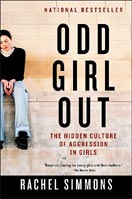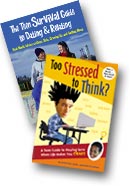Welcome to
Annie Fox's Parent Forum Newsletter

About this Newsletter
Annie Fox’s Parent Forum Newsletter helps you build healthier relationships with your teen and pre-teen sons and daughters.
This free newsletter features parenting tips, recommended books, letters from parents about their teens, letters from teens
about their parents, and a schedule of Annie’s live events. Adults who live and work with teens need as much encouragement
and support as they can get. So please forward this newsletter to parents, educators, counselors, mentors
or community activists who’d find value in it.
New Press Coverage
 On
April 16, Annie was featured in the Marin Independent Journal. Click
here to download a PDF of the interview. On
April 16, Annie was featured in the Marin Independent Journal. Click
here to download a PDF of the interview.

May Parenting Article
Real Friends vs. the Other Kind
by Annie Fox, M.Ed.
| “...until kids can see that they’re making
unhealthy choices ... they’re going to feel stuck in unhappy friendships with no awareness of their own power
to make changes.” |
|
 When
our kids are little, we actively teach them the importance of being nice to others. Most 2-3 year olds have repeatedly been
commanded to “Share!” They usually comply—not because they’re altruistic by nature, but because they
know they’ll catch it from Mom if they don’t. As parents and as members of society, we have a vested interest
in teaching children empathy, compassion, etc. But what happens to those lessons when they get older?
As friends play an increasingly vital and complex role in adolescents’ lives, we should continue discussing
these issues. But for some reason, parents of middle and high school kids don’t often talk about what it
takes to be a good friend and how to stand up for yourself when you’re not being treated with respect.
 Tina
and Danielle have been best friends since 2nd grade. Now as 6th graders, Danielle has been hanging out with the
popular girls. Monday at lunch, Danielle was with her new friends. Tina tried talking to her, but Danielle made
some joke about Tina’s shoes and all the other girls laughed. That hurt, but Tina pretended it didn’t
bother her. On Tuesday Danielle ignored her old friend completely. At the end of the day Tina got up the courage
to ask what was going on. Danielle just smiled sweetly and said, “What are you talking about?” Tina
thought that maybe she imagined the whole thing. On Wednesday morning, a couple of popular girls asked Tina why
she was being so mean to Danielle. Tina’s heart pounded as she denied it. The girls exchanged a knowing
look and walked away. By lunch Tina’s fate was sealed – not one girl in the 6th grade girl would
talk to Tina. Tina
and Danielle have been best friends since 2nd grade. Now as 6th graders, Danielle has been hanging out with the
popular girls. Monday at lunch, Danielle was with her new friends. Tina tried talking to her, but Danielle made
some joke about Tina’s shoes and all the other girls laughed. That hurt, but Tina pretended it didn’t
bother her. On Tuesday Danielle ignored her old friend completely. At the end of the day Tina got up the courage
to ask what was going on. Danielle just smiled sweetly and said, “What are you talking about?” Tina
thought that maybe she imagined the whole thing. On Wednesday morning, a couple of popular girls asked Tina why
she was being so mean to Danielle. Tina’s heart pounded as she denied it. The girls exchanged a knowing
look and walked away. By lunch Tina’s fate was sealed – not one girl in the 6th grade girl would
talk to Tina.
What had Tina done to turn everyone against her? She’d broken a cardinal rule of girl friendships: No matter
how much your friend hurts you, do NOT talk honestly to her about it or you risk losing all your friends.
What happened to being assertive? What happened to self-respect? What can parents do to help their daughters stand
up for themselves?
Continue reading the rest of the
article...

May’s Recommended Read
 Odd
Girl Out: The Hidden Culture of Aggression in Girls Odd
Girl Out: The Hidden Culture of Aggression in Girls
by Rachel Simmons
Anyone with a daughter past pre-school age ought to read this book… immediately. In fact, I’d suggest
that you share parts of it with your daughters. It will serve as a powerful discussion driver.
Odd Girl Out provides
an in-depth exploration of “alternative aggression” (rumor spreading, non-verbal gestures, alliance building,
shunning, etc.), an undeniable part of girl culture. If your daughter hasn’t yet been brushed or battered by this
behavior at the hands of her so-called friends, she’s lucky. Unfortunately, she’s very likely to encounter
it in one degree or another before she graduates high school.
Here’s the problem: middle-class girls are socialized to be “nice.” Because all human beings (including
nice girls) sometimes have intense feelings of jealousy, resentment, competition, and unadulterated anger toward their
friends, girls are in a terrible bind. They simply don’t have the tools or the role models for being “nice” and “angry.” Nor
can they give themselves permission to be direct and assertive… not when it comes to their friends. Therefore they
must figure out ways to vent their inevitable aggression covertly and/or swallow their hurt when they’re targeted.
| “...Since
relationship is precisely what good, ‘perfect’ girls are expected to be in, its loss, and the prospect of
solitude, can be the most pointed weapons in the hidden culture of girls’ aggression.” —Rachel
Simmons |
If you’ve ever heard your daughter talk about what other girls have done (they rarely admit to any of this behavior
themselves) you can’t help but be amazed at how convoluted, controlling, calculating and manipulative it all is.
Through Simmons’ very personal interviews with 5th-12th graders, moms, and some twenty and thirtysomethings, she
shines a light on the little known world of girl culture where abuse and emotional devastation mostly exists below the
radar of parents and teachers.
When adults become aware of what’s going on, they have trouble understanding how otherwise nice girls could so callously
commit such cruel acts. And why would the targeted girls refuse to stand up for themselves and instead, remain in these
abusive friendships?! For girls, the reasons are perfectly logical. They clearly explain that they put up with abuse because
the alternative, social isolation, is worse than death. As Simmons puts it, “Since relationship is precisely what
good, ‘perfect’ girls are expected to be in, its loss, and the prospect of solitude, can be the most pointed
weapons in the hidden culture of girls’ aggression.”
Visit Rachel Simmons’ Web site here.
Check out my Recommended
Books here...
| |

|
Annie's Books
 The
main focus of my work is helping teens and pre-teens navigate their way through the maze of adolescence. I write
my books for teens, but any adult who wants to understand them better should read them too. “The
Teen Survival Guide to Dating and Relating” and “Too
Stressed to Think? A teen guide to staying sane when life makes you CRAZY” (co-written
with Ruth Kirschner) are available here, or from Amazon or at your local bookstore. Order an autographed copy of
it directly from me and pay by credit card at our own online store. Order
your copy here! The
main focus of my work is helping teens and pre-teens navigate their way through the maze of adolescence. I write
my books for teens, but any adult who wants to understand them better should read them too. “The
Teen Survival Guide to Dating and Relating” and “Too
Stressed to Think? A teen guide to staying sane when life makes you CRAZY” (co-written
with Ruth Kirschner) are available here, or from Amazon or at your local bookstore. Order an autographed copy of
it directly from me and pay by credit card at our own online store. Order
your copy here!
|

Letters from Parents and Teens about Family Problems
Some of our most valuable and enduring relationship lessons come from inside the family. These can have long-reaching
effects on the way our kids conduct themselves in close relationships throughout their lives:
“I want my daughter to stand up to her mother.”
Dear Annie,
I have an issue regarding my 14 year-old daughter’s relationship with her Mom (two-homes). Long story short, Mom
imposes her desires on our daughter and thinks our daughter “agrees.” Our daughter does not. Therapy session
set for tomorrow. Mom has been invited to hear daughter’s feelings but Mom refuses to come. Mom doesn’t believe
there’s a problem. She thinks daughter wants same thing as her. I know the other side of the story. My daughter lacks
courage to speak her true feelings to Mom because Mom browbeats and yells. I want to empower daughter to find “her
voice” with Mom (and with me and everyone one in her life). To avoid conflict, daughter deals in vagaries as a defense
with Mom, leading Mom to believe wrong things; to make predisposed assumptions.
How do I get my daughter to learn to share her true feelings and learn to manage the fallout with Mom well?
Thanks,
Montana Dad
|
 |
Dear Montana Dad,
I’m sorry your daughter is unable to speak her mind to her mom, but from the girl’s point of view, what she’s
doing makes some sense. If, for example, anytime she disagrees with mom she gets “brow beaten and yelled at”...
well, anyone would naturally want to avoid that response. If she were an adult getting that from a friend, she could choose
to stay away. But with her mom, what choices does she have other than to feign compliance? From her perspective, she’s
doing what she needs to do to avoid conflict with mom.
I understand that you want to help your daughter become more assertive because it’s important in the overall scheme
of things that she learn to be open and honest (especially in close relationships).
I suggest you bring up this discussion in tomorrow’s session. Let the therapist help your daughter (in safe ways)
to negotiate her current emotional landscape with her mom.
As for you, Dad, my suggestion is that you role model the communication skills you want your daughter to value and emulate.
Encourage her, in your relationship with her, to be assertive and honest and open. Just be realistic in your expectations.
Hey, you were married to her mom so maybe you know it’s not so easy! If that was the case, then imagine how much
more challenging it might be for a 14 year old.
I hope this helps.
In friendship,
Annie
|
Friendship issues can be overwhelming and confusing for tweens and teens. Often they have more questions than they have
answers for:
“I’m not sure I want to be me in this friendship any more.”
Hey Terra,
My best friend can get easily jealous. If I’m with her and a bunch of other friends, and I don’t talk to her,
she’ll get really sad because I’m not talking to her. But when she ignores me for her other friends I don’t
complain to everyone about how I’m ignored like her. It bothers me but I don’t tell anyone that it does. Do
you think that this friendship is worth staying in?
Teddy Bear
|
 |
Dear Teddy Bear,
Before you decide whether to end your friendship, how about telling your best friend what you told me? Shouldn’t
you have honesty in a friendship? Shouldn’t you be able to say: “I really care about our friendship and I want
to make it stronger. I want to work on problems when they come up so that bad feelings don’t get so big they make
us not want to spend time together. It makes me feel smothered (or whatever) when we’re with a bunch of people and
you seem upset when I talk to them and not just to you. I’d like to talk about that.”
Then see what she says.
And please don’t say that you can’t tell her the truth because it will “hurt her feelings.” (I hear
that a lot.) If it’s your intention to make the friendship stronger, then “clearing the air” is very important.
If you keep quiet about this you’re going to end up losing your best friend.
In friendship,
Terra
|
Got a parent-teen problem you need help with? Click
here to Ask Annie
Read other parents’ questions here.
Read teens’ letters about parents here.
If you’re a teen and you need some help, click
here.

Upcoming Events
While the school year is winding down, Annie
has launched a new series of "Friendship Workshops" for Girls Scouts in the early grades. Click
here to
learn more about this new workshop. Click
here for her full calendar of events.
If you want Annie to speak at your school, event, or conference, click
here.

Resources
Past Newsletters – read our archive of
past Parent Forum Newsletters.
Recommended Books – Annie
highly recommends these parenting books.
AnnieFox.com – includes letters from teens and parents,
Parent Forum articles past and present, information about Annie’s
books, and workshops/seminars.
The InSite (www.TheInSite.org)
– created especially for teens who have ever thought about making a difference. The InSite provides
teens with the information, the inspiration, and many possible game plans so they can take charge of their choices
and their lives.

If this newsletter was forwarded to you
and you’d like to subscribe (free!), click
here.
|
![]() On
April 16, Annie was featured in the Marin Independent Journal. Click
here to download a PDF of the interview.
On
April 16, Annie was featured in the Marin Independent Journal. Click
here to download a PDF of the interview. 

 Tina
and Danielle have been best friends since 2nd grade. Now as 6th graders, Danielle has been hanging out with the
popular girls. Monday at lunch, Danielle was with her new friends. Tina tried talking to her, but Danielle made
some joke about Tina’s shoes and all the other girls laughed. That hurt, but Tina pretended it didn’t
bother her. On Tuesday Danielle ignored her old friend completely. At the end of the day Tina got up the courage
to ask what was going on. Danielle just smiled sweetly and said, “What are you talking about?” Tina
thought that maybe she imagined the whole thing. On Wednesday morning, a couple of popular girls asked Tina why
she was being so mean to Danielle. Tina’s heart pounded as she denied it. The girls exchanged a knowing
look and walked away. By lunch Tina’s fate was sealed – not one girl in the 6th grade girl would
talk to Tina.
Tina
and Danielle have been best friends since 2nd grade. Now as 6th graders, Danielle has been hanging out with the
popular girls. Monday at lunch, Danielle was with her new friends. Tina tried talking to her, but Danielle made
some joke about Tina’s shoes and all the other girls laughed. That hurt, but Tina pretended it didn’t
bother her. On Tuesday Danielle ignored her old friend completely. At the end of the day Tina got up the courage
to ask what was going on. Danielle just smiled sweetly and said, “What are you talking about?” Tina
thought that maybe she imagined the whole thing. On Wednesday morning, a couple of popular girls asked Tina why
she was being so mean to Danielle. Tina’s heart pounded as she denied it. The girls exchanged a knowing
look and walked away. By lunch Tina’s fate was sealed – not one girl in the 6th grade girl would
talk to Tina.
